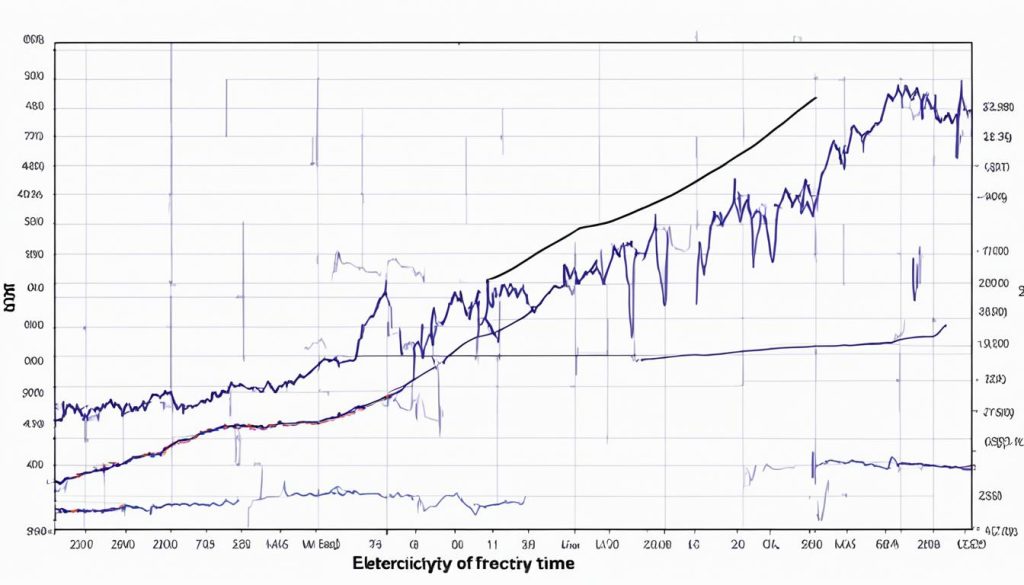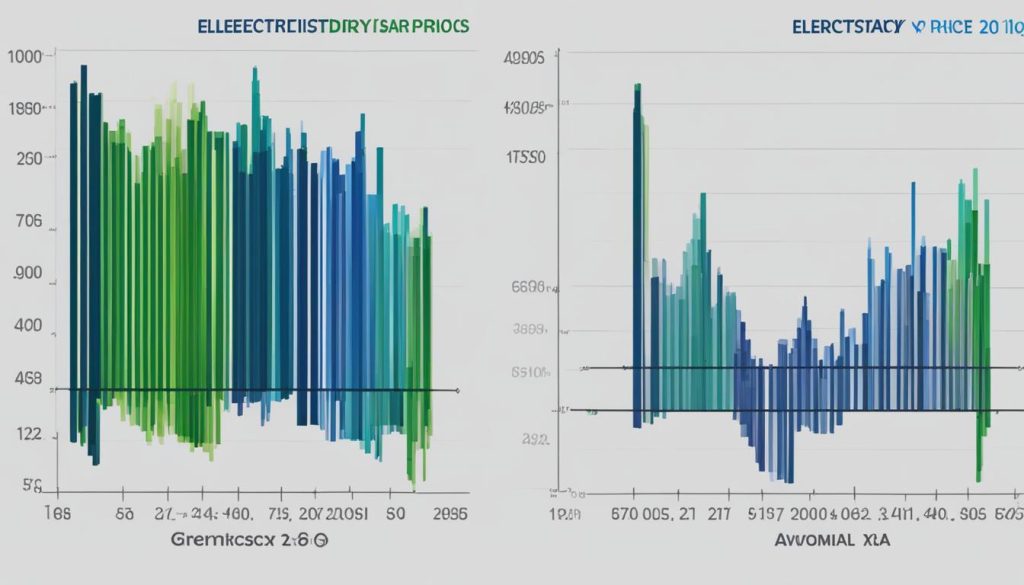UK Electricity Prices: Trends & Forecasts
Electricity prices in the United Kingdom have been a topic of concern for consumers and businesses alike. As energy costs continue to rise, it becomes increasingly crucial to stay informed about the current trends and forecasts. This section will provide an overview of the factors influencing electricity prices in the UK, including wholesale energy prices, government policies, and renewable energy sources. It will also highlight any significant changes in the energy market that could impact pricing in the future.
Key Takeaways
- UK electricity prices are influenced by various factors such as government policies, renewable energy sources, and wholesale energy prices.
- It is essential to stay informed about current trends and forecasts to make informed decisions about energy consumption.
- Consumers and businesses can compare electricity rates from different suppliers and find the best plan that suits their needs.
- The fluctuating prices make it crucial to consider factors such as fixed vs. variable rates and contract terms.
- Keeping up-to-date with changes in the energy market can help consumers navigate rising costs efficiently.
Understanding UK Electricity Prices
Electricity prices in the UK are influenced by several factors, including generation, transmission, and distribution costs. To further understand these prices, it is essential to look at each component of the electricity bill.
Components of an Electricity Bill
An electricity bill consists of different charges, which include:
- Generation costs: These are the costs incurred in producing electricity, such as fuel costs and labor costs.
- Transmission costs: These are the costs incurred in moving electricity from the generators to the distribution network.
- Distribution costs: These are the costs incurred in delivering electricity to customers through local power lines and substations.
- Environmental costs: These are costs associated with renewable energy initiatives and government policies aimed at reducing greenhouse gas emissions.
Each of these components contributes to the overall cost of electricity, and their impact varies depending on the supplier and region. Therefore, it is crucial to compare electricity rates from different suppliers before settling on one.
Factors Affecting UK Energy Prices
Several factors affect UK energy prices, including:
- Wholesale energy prices: The cost of generating electricity directly affects the price consumers pay. Wholesale energy prices in the UK are subject to fluctuation, depending on supply and demand forces.
- Government policies: The government’s initiatives, including environmental policies and energy efficiency programs, impact energy prices. These policies aim to reduce carbon emissions, promote renewables, and increase energy efficiency.
- Renewable energy sources: The use of renewable energy sources, including wind and solar power, has increased in recent years. However, an increased reliance on renewables can lead to higher prices in the short term, due to their production costs.
It is worth noting that the UK has a competitive energy market that allows consumers to compare rates from different suppliers and choose the most affordable plan.
“The UK energy market is gradually shifting towards renewables, which have a significant impact on prices. It is essential to stay informed about changes in the energy market and compare suppliers to get the best rates.”

Comparing and Finding the Best Electricity Prices in the UK
Consumers in the UK have the power to compare and find the best electricity prices for their households or businesses with the help of available online tools and resources. Comparing electricity prices in the UK ensures that consumers are getting the most affordable rates and cost-effective energy plans for their needs. There are several factors to consider when comparing prices, including fixed vs. variable energy rates, contract terms, and promotional offers.
One of the best ways to compare electricity prices in the UK is to use online comparison tools. These tools allow consumers to enter their postcode and current supplier, and compare prices from different suppliers in their area. The comparison tools provide a clear overview of the different energy plans and rates, allowing consumers to make an informed decision of the best option for their needs.
Another essential factor to consider when comparing electricity prices in the UK is choosing between fixed or variable energy rates. Fixed rates provide security and stability in energy prices, as the rates are locked in for the duration of the contract, usually for one to three years. Variable rates, on the other hand, fluctuate based on market trends, and as such, the price of electricity can increase or decrease over time.
When identifying the cheapest and most cost-effective energy plans, it’s vital to consider the contract terms and conditions. Some suppliers may offer discounts or lower rates for long-term contracts, while others may require exit fees for early termination. Consumers must read and understand the terms and conditions before signing a contract or switching suppliers.

Cheapest Electricity Prices in the UK
| Supplier | Plan Name | Rate Per kWh |
|---|---|---|
| Octopus Energy | Flexible Octopus | 14.35p per kWh (variable) |
| Bulb | Vari-Fair | 15.99p per kWh (variable) |
| Utility Point | Just Up 21 Wk22 | 16.19p per kWh |
| Green Network Energy | GNE Spring Sunrise v4 | 16.21p per kWh (variable) |
| Together Energy | Green Together Fixed June21 | 16.25p per kWh (fixed) |
It’s important to note that these rates may vary based on location and usage, and consumers must use comparison tools to obtain the most accurate and up-to-date rates.
In conclusion, comparing electricity prices in the UK is an essential step to ensure that consumers are getting the best rates and most cost-effective energy plans. By considering factors such as fixed vs. variable rates, contract terms, and promotional offers, consumers can identify the cheapest and most favorable energy plans for their needs.
Conclusion
In conclusion, electricity prices in the UK can be influenced by various factors, including wholesale energy costs, government policies, and renewable energy sources. Consumers can compare and find the best electricity prices by utilizing available tools and resources that allow them to compare rates from different suppliers. It is essential to consider factors such as fixed vs. variable rates and contract terms when choosing an energy plan to ensure it is the most cost-effective option.
Staying informed about changes in the energy market is crucial for consumers to navigate the fluctuating prices efficiently. It is anticipated that electricity prices in the UK will continue to evolve as the energy market and government policies adapt to meet changing demands and address environmental concerns.
Overall, while it may seem daunting to navigate and understand electricity prices in the UK, it is possible to find cost-effective energy plans with a little research and knowledge.
By taking the time to understand the various factors that contribute to electricity prices and utilizing available resources, consumers can make informed decisions about their energy usage and potentially save money on their bills.
In short, the future of electricity prices in the UK remains uncertain, but with careful consideration and attention to market trends, individuals can stay ahead of the curve and make informed choices about their energy consumption.
So, whether you’re a homeowner or business owner, it pays to stay informed and shop around for the best electricity prices in the UK!
FAQ
What factors influence electricity prices in the UK?
Electricity prices in the UK are influenced by various factors, including wholesale energy prices, government policies, infrastructure costs, and renewable energy sources. Changes in any of these factors can affect the overall rates.
How are UK electricity prices calculated?
UK electricity prices are calculated based on several components, including generation, transmission, and distribution costs. Generation costs involve the production of electricity, while transmission and distribution costs cover the transportation of electricity to consumers’ homes or businesses.
How can I compare electricity prices in the UK?
There are various tools and resources available that allow consumers to compare electricity prices from different suppliers in the UK. Websites, price comparison platforms, and energy market websites provide easy access to compare rates and find the most cost-effective energy plans.
What are some tips for finding the cheapest electricity prices in the UK?
To find the cheapest electricity prices in the UK, consider factors such as fixed vs. variable rates, contract terms, and any additional fees or discounts offered by suppliers. It’s important to evaluate the overall cost and value of the energy plans, ensuring they align with your energy consumption patterns.
What should consumers consider when choosing an electricity supplier in the UK?
When choosing an electricity supplier in the UK, consumers should consider the supplier’s reputation, customer service quality, pricing structure, and any additional services or benefits provided. Reading reviews and comparing supplier offers can help make an informed decision.
Are there any government programs or initiatives to help reduce electricity prices in the UK?
The UK government has implemented various programs and initiatives to encourage energy efficiency and the use of renewable energy sources. These initiatives aim to reduce overall electricity demand and promote the adoption of low-carbon technologies, which can have a positive impact on electricity prices in the long run.




